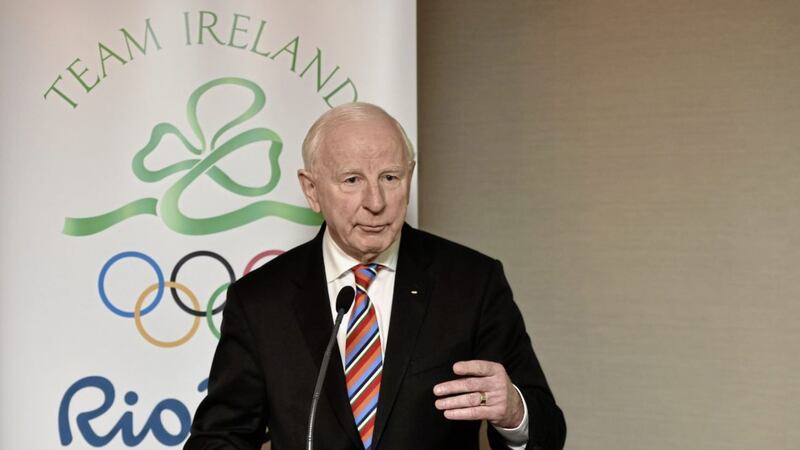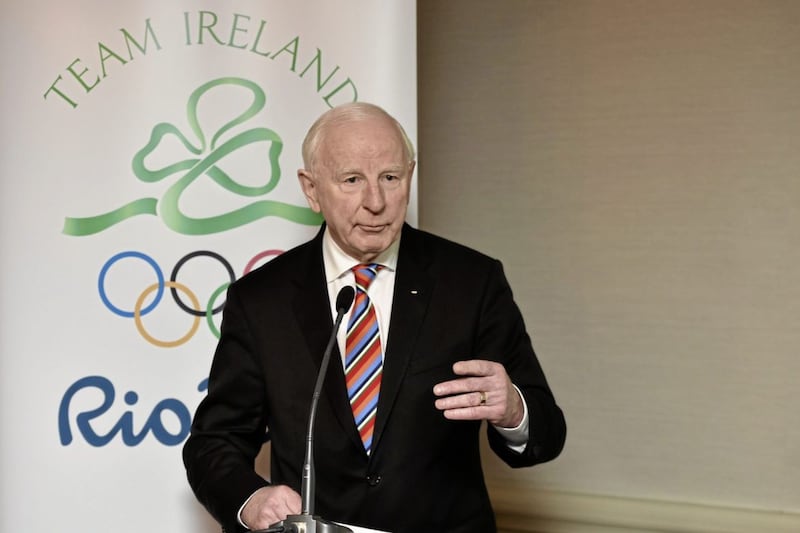Two ticketing firms paid a total of $1.6 million to get rights to resell Ireland's tickets at the London, Sochi and Rio Olympics, an inquiry has found.
The judge-led investigation found that deals between the Olympic Council of Ireland (OCI) and THG Sports, owned by Ipswich Town FC owner Marcus Evans, and Pro10, a second company linked to the businessman, were more concerned with their commercial interests than the athletes, their friends, relatives and supporters.
The report questioned how THG and Pro10 could recoup the million dollar investment.
The inquiry into Olympic tickets sales was sparked after former OCI chief Pat Hickey was arrested and detained in prison in Brazil on accusations of ticket touting, running a cartel and illicit marketing.
He did not co-operate with the investigation by Judge Carroll Moran.
Neither did ticket reseller for Rio Pro10, nor the International Olympic Committee or the Rio Organising Committee of the Olympic Games (Rocog).
But Judge Moran accepted parties had the right to refuse co-operation.
On the money trial, the inquiry questioned the million dollar investment in tickets and the judge said: "This was done without an explanation being given at the time as to how it would recoup this sum or earn a return on such a large outlay."
THG paid $1 million for the rights to access OCI tickets for London 2012 and the winter games in Sochi 2014.
Pro10 paid $600,000 for the same in Rio.
Judge Moran said authorised ticket reselling was restricted to a 20% mark up on face values.
"If THG was restricted to adding only 20% on each ticket, then in order to recoup the rights fees, it would have had to sell a much greater quantity of tickets than those allocated to the OCI," the report said.
"A similar issue arises in respect of the agreement by Pro10."
Mr Evans' THG said it told the Moran inquiry that it could not give information because of ongoing "legal issues in Brazil".
"THG wishes to reaffirm that it is satisfied that, at all times, it has acted lawfully in connection with the Rio Olympics, or any Olympics and will make no further comment," it said.
Judge Moran said there appeared to be an interest in the reseller getting an increased number of tickets at Rio 2016, but an increased number of tickets to certain high profile events, even if there was little Irish interest in them.
He said Pro10 was to get all 46 National Olympic Committee Family Tickets for the opening and closing ceremonies and almost all the tickets for five of the athletics finals.
It got a total of 178 of these tickets which are normally reserved for someone linked to the OCI like a sponsor or coach.
Judge Moran's report found that Pro10 was not a genuine authorised ticket reseller.
It said the company, set up in May 2015 after THG was rejected by Rocog as a ticket agent, disguised the continuing role of THG and Mr Evans as the real agent for Irish tickets in Rio.
Kevin Mallon, a director of THG Sports, was also detained on charges of mis-selling tickets for the Rio games.
The report said Pro10's service was "inadequate".
The judge described it as "unfit for its purpose, ineffective and chaotic" with complaints from athletes, their relatives and friends, members of sports federations and the public.
The judge found a lack of information and transparency on ticketing by both Pro10 and the OCI.
Judge Moran said there was an inference that THG needed a significant sale of tickets to high profile events at the games, with hospitality, in order to recoup its investment.
Individuals who bought tickets from THG or Pro10 could not be traced, the report said and Judge Moran said he could not put a number on how many tickets the agents sold, at what price or with what offer of hospitality.
The report also raised concerns that money for premiums for tickets for some big event does not appear in the OCI accounts.
A spokesman for PRO10 declined to respond to the findings.
The report found evidence in emails of a longstanding relationship between Mr Hickey and Mr Evans, and contacts between the pair continued despite Mr Evans' THG being rejected as an agent for Rio tickets.
Judge Moran said it was difficult to accept Mr Hickey's claim in an interview with RTE in Rio when the controversy broke that the OCI's links with THG were severed after Sochi.
The report also found Mr Hickey was paid €60,000 a year from 2010 to 2015 while president of the OCI, worth about 5% of the organisation's annual income. He received the €360,000 in 2015.
It was paid for his "endeavours" as a marketing executive and his efforts to get "substantial sponsorship agreements".
Sports Minister Shane Ross defended the inquiry, even though Mr Hickey and others could not be forced to give evidence.
"I believe that if they had co-operated this report would be more complete. I understand that those parties have the right not to incriminate themselves," he said.
President of the OCI Sarah Keane said the Rio ticketing scandal did immense financial and reputational damage to the organisation.
"We are very keen to ensure that the shortcomings outlined in the report are comprehensively addressed without delay," she said.
"We know from speaking to athletes and their families that many felt let down by what happened in Brazil and for that we are sorry. It is the intention of the new Executive Committee to deliver a fit for purpose organisation that has athletes, transparency, accountability and governance at its core."







